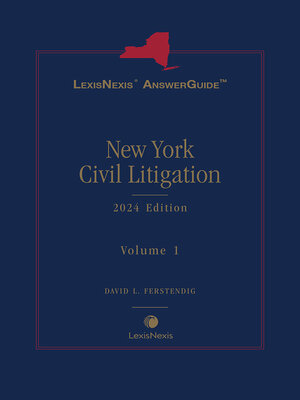LexisNexis AnswerGuide: New York Civil Litigation
ebook ∣ Volume 1 · LexisNexis AnswerGuide: New York Civil Litigation (2025)
By David L. Ferstendig

Sign up to save your library
With an OverDrive account, you can save your favorite libraries for at-a-glance information about availability. Find out more about OverDrive accounts.
Find this title in Libby, the library reading app by OverDrive.



Search for a digital library with this title
Title found at these libraries:
| Library Name | Distance |
|---|---|
| Loading... |
The LexisNexis AnswerGuide New York Civil Litigation provides direct, New York–specific answers to questions that arise in day-to-day practice. It offers valuable insights prepared by a subject matter expert and active New York practitioner for dedicated trial lawyers, civil practitioners, new associates and paralegals. It covers important topics related to civil litigation, including initial pleadings, jurisdiction, statutes of limitations and venue. It includes over 65 detailed, task-oriented checklists and 150 practice pointers (Warning, Strategic Point, Exception, Timing) to ensure best practices and avoidance of potential practice pitfalls.
The LexisNexis AnswerGuide focuses on actions in New York Supreme Court and County Court. Procedures in the Civil Court, District Court, City Court and Town and Village Courts can vary markedly from Supreme Court and County Court procedure and the rules of those courts must be consulted.
Litigation strategy must be charted early and devised by the practicing attorney. Waiting until discovery is completed or when the trial is imminent is a dangerous and unreliable path to success at all legal practice matters.
Plaintiff's counsel must first determine the objective of the action. For example:
Mapping the strategy of the case must begin before an action is commenced. Once the objective of the action is determined, assuming arbitration, mediation, and settlement are not options, counsel must decide whether to sue in federal court or in state court. Unless there is diversity of citizenship or a federal question (28 USCS §§ 1331, 1332), the case must be brought in state court.







